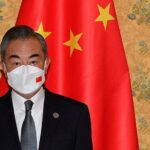The agreement, presented as “historic”, is the result of a normalization of diplomatic relations that began in 2020. Israel and the United Arab Emirates signed a free trade agreement on Tuesday, May 31. The first of its kind between the Jewish state and an Arab country.
This agreement abolishes customs barriers for “96% of the products” exchanged between the two parties, whose trade amounted to 900 million dollars (814.4 million euros) in 2021, according to official Israeli data.
“Israel and the Emirates have signed a historic free trade agreement, the first of this magnitude between Israel and an Arab country,” Israeli Prime Minister Naftali Bennett said on Twitter. Under the aegis of my friend Mohammed Bin Zayed [Al-Nayane, leader of the Emirates] and thanks to a lot of determination, this is the fastest signed free trade agreement in the history of Israel.
The Emirates and Bahrain normalized relations with Israel in 2020 under a series of agreements negotiated with the United States. Morocco followed suit, while Sudan also agreed to normalize ties with Israel, although it has yet to finalize the deal.
Unprecedented success
Given the free trade agreement signed on Tuesday, the talks began in November and were concluded in early April after four negotiating sessions. The last took place in Egypt between Mr. Bennett and Mohammed Ben Zayed Al-Nahyan, the crown prince who became head of state in mid-May after the death of his half-brother, Sheikh Khalifa Bin Zayed Al-Nahyan.
“Emirati-Israeli trade will surpass $2 billion in 2022 and reach around $5 billion in five years, supported by collaboration in the renewable energy, consumer goods, tourism, and life sciences sectors, ” said Dorian Barak, chairman of the Emirati-Israeli Business Council, in a statement. “Dubai is becoming a hub for Israeli companies that see South Asia, the Middle East, and the Far East as markets,” he added. According to him, nearly a thousand Israeli companies will have ties with the Emirates by the end of the year.
For the Ambassador of the Emirates to Israel, Mohamed Al-Khaja, the signing of this agreement is an “unprecedented success”. “Businesses in both countries will benefit from faster access to markets and lower tariffs, as our nations work together to increase trade, create jobs and strengthen the cooperation”, he wrote on Twitter.
Tension in Israel
The signing of this agreement comes two days after the “March of the Flags“, a parade in the Old City of Jerusalem, in which thousands of Israelis took part to commemorate the conquest of the eastern part of the city, in 1967, and whose the annexation was never recognized by the international community.
The march took place against a backdrop of tensions between security forces, Israeli demonstrators, and Palestinians, who consider this annual procession a provocation. About 2,600 non-Muslims, tourists, and Israelis visited the Esplanade des Mosques, one of Islam’s holiest sites, on Sunday, a number far higher than usual. The Emirates “strongly condemned” this “assault” on Monday.
The free trade agreement was also signed nearly three weeks after Palestinian-American Al-Jazeera journalist Shireen Abu Akleh was killed on May 11 during an Israeli operation in the West Bank.
According to the Palestinian prosecutor, she was killed by an Israeli soldier. An Israeli army investigation finds it impossible to determine whether she was killed by a Palestinian or an Israeli soldier. The Emirates called for an “impartial, independent and transparent investigation”.




GIPHY App Key not set. Please check settings